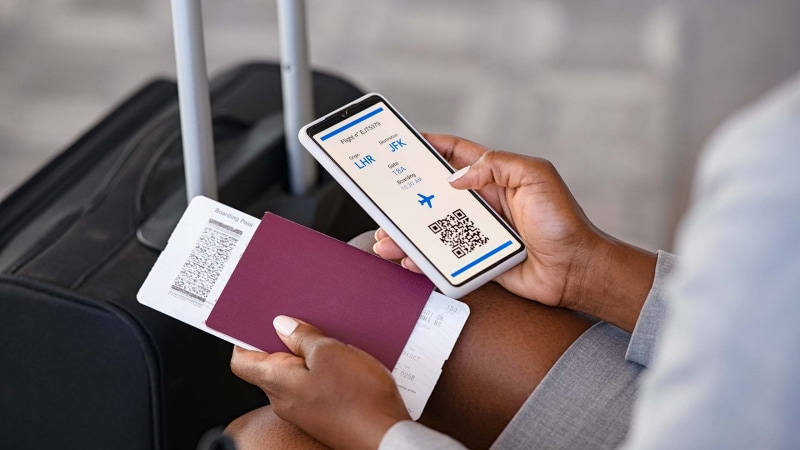Frequent flyer programs: A guide

If you’re on a first-name basis with your airport security agents, you may have wondered if joining a frequent flyer program could benefit your on-the-go lifestyle. These programs may be a great way to earn and redeem frequent flyer miles or points, which may help cover your future travel expenses. Let’s learn more about what frequent flyer programs are and things to consider before joining one.
What is a frequent flyer program?
Frequent flyer programs are loyalty programs offered by airlines to reward you as a customer for traveling with them or their partners. The specific perks and potential fees between programs differ depending on the airline, but they all tend to share a common process.
Typically, signing up for a frequent flyer program allows you to earn frequent flyer miles or points. These are a specific type of currency reward that you earn when you purchase airfare with that program’s airline. Usually, you’ll earn a certain number of miles (sometimes referred to as “points” in some programs) per dollar you spend or per actual miles flown (which is where the name originates from).
Frequent flyer programs and travel credit cards
Frequent flyer programs may be a simple way to earn airline miles or points that may be redeemed for discounted flights or upgrades. However, you may accumulate airline miles by booking flights and making other direct purchases with that program’s airline. Miles and points can also be earned when using an airline credit card or a travel credit card.
Airline credit cards are cards that are partnered with specific airlines. Cardmembers automatically become loyalty members of the frequent flyer program and, therefore, earn miles or points when making purchases with their card that can be redeemed for airfares through that program's airline. Some airline credit cards may also offer more air travel perks, like in-flight Wi-Fi and discounted food and beverages.
Travel credit cards are generally flexible because they allow you to earn points through eligible purchases made across multiple spending categories and airlines. Points may be redeemed for travel-related expenses across multiple airlines or non-travel related options.
Benefits of frequent flyer programs
The perks of joining a frequent flyer program may differ between airlines, some common benefits include:
- Using earned rewards towards flights: Frequent flyer programs may allow you to redeem your miles or points toward the cost of your next flight through their airline.
- Cabin upgrades: Frequent flyers can typically redeem their miles or points to upgrade to a higher cabin class.
- Lounge access: Many frequent flyer programs allow members access to their airline lounge, which can include food, drinks and seating that’s typically more comfortable than what you’d find at your gate. Be sure to read your program's terms and conditions as some airlines offer this access complimentary to members while others may charge a fee.
- Complimentary checked bags: Frequent flyers often receive complimentary bag checks with their program’s airline.
- Priority boarding: Snag some room for your carry-ons and get some extra time to settle in as a frequent flyer, since most programs usually include priority boarding access for members.
Drawbacks of frequent flyer programs
Frequent flyer programs may be a great way to take advantage of your favorite airlines travel perks, but they could also come with a few drawbacks like:
- Blackout dates: Many frequent flyer programs restrict your ability to redeem miles or points during peak seasons for air travel, like major holidays.
- Mileage expiration dates: Some programs may only allow you to redeem your frequent flyer miles for a specific window before they expire. If you wait too long or forget about the miles you’ve accumulated, you might ultimately lose them.
- Earning or redemption restrictions: Typically, frequent flyer programs only allow you to earn and redeem miles through the airline sponsoring the program. If you tend to fly with multiple airlines, this may hinder your ability to accumulate enough redeemable miles before they expire.
- Potential fees: Some frequent flyer programs are free to join, but others may charge you an annual fee. Additionally, some programs may charge you for access to certain perks, like lounge access.
Tips for choosing between frequent flyer programs
Choosing the right frequent flyer program may take researching and comparing programs to find the one that suits your lifestyle best. During your research process, it may help to:
- Consider your travel habits: Most frequent flyer programs only allow you to earn miles when you travel with their airline. Choosing a program through an airliner that you fly with most often may be an easy way to pare down your options.
- Compare earn and redeem rates: There’s usually a difference between the rate at which you earn miles and how much redeemable value they hold. Cross-comparing competitive rates between different programs may help you understand how advantageous a particular program may be for you.
- Check for annual fees: While some programs are free, others include annual fees. Additionally, some frequent flyer programs may charge you for access to certain benefits. Consider reading through and understanding the potential costs and fees associated with each program as you weigh your decision.
- Count the perks: Not all frequent flyer programs are created equal, and some may offer perks that others don’t. Consider asking yourself what benefits are most important to you and finding programs that offer them.
In summary
If you’re loyal to a particular airline, joining their frequent flyer programs may offer you a way to enjoy some perks while also earning some potential discounts miles on future travel expenses. While frequent flyer programs have their benefits, they may have their downsides as well — like potential annual fees or blackout dates. In the end, it’s helpful to do your research and understand each program’s terms and conditions before joining.
Frequent flyer program FAQs
1. How do I join a frequent flyer program?
You can typically enroll in an airline’s frequent flyer program online from a sign-up page found through the airline’s official website. You may also be able to sign up in person through an airline representative at the airport.
2. Are frequent flyer programs worth it?
Frequent flyer programs may be worth it if you’re a frequent flyer who’s loyal to a particular airline. If you don’t travel often or usually fly with multiple airlines, you may not accumulate enough airline miles to make membership beneficial for you.
3. Do frequent flyer programs cost money?
Some frequent flyer programs are free to join while others charge an annual fee to maintain membership. Fees may also vary between different programs from the same airline. Consult your membership agreement to learn more about any potential fees.
4. Can I have multiple frequent flyer programs?
There is no limit to the number of frequent flyer programs you can join, though the possibility of paying fees across multiple programs may be somewhat restrictive.



